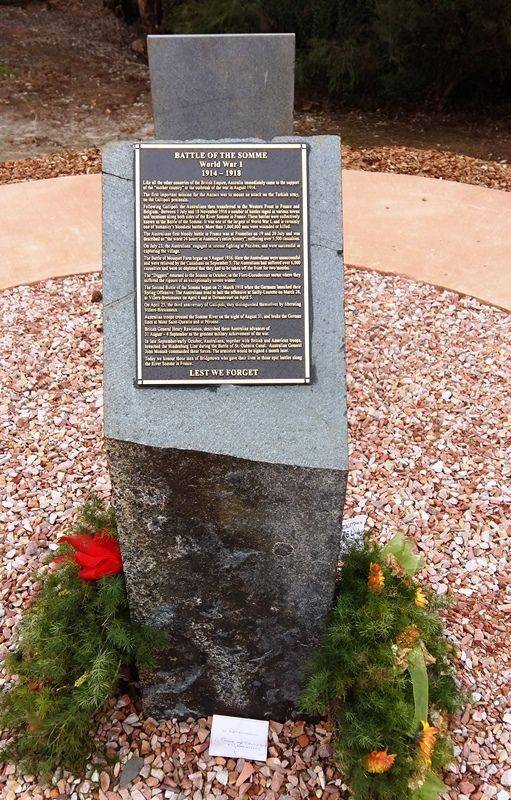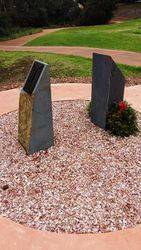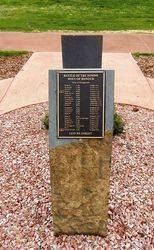
Home » Themes » Conflict » World War One
Battle of the SommePrint Page 
The monument of two freestanding granite blocks commemorates the Bridgetown men who were killed in action during the Battle of the Somme in France In World War One.
One plaque lists the names of the men killed, and the other provides an overview of the history of the Battle of the Somme.
Location
| Address: | Steere & Barlee Streets, Somme Creek Parklands, Bridgetown, 6255 |
|---|---|
| State: | WA |
| Area: | AUS |
| GPS Coordinates: | Lat: -33.958056 Long: 116.144167 Note: GPS Coordinates are approximate. |
Details
| Monument Type: | Monument |
|---|---|
| Monument Theme: | Conflict |
| Sub-Theme: | WW1 |
| Actual Event Start Date: | 30-May-1916 |
| Actual Event End Date: | 08-August-1918 |
| Designer: | Members of the Bridgetown R.S.L. Club |
| Monument Manufacturer: | Plaques manufactured by Arrow Bronze, Victoria. Granite blocks provided by Joystone Australia & the Wheatley Family, |
Dedication
| Actual Monument Dedication Date: | Saturday 23rd July, 2016 |
|---|
Battle of the Somme
Roll of Honour
Sons of Bridgetown
[ Names ]
Lest We Forget
Battle of Tthe Somme
World War 1
1914 – 1918
Like all the other countries of the British Empire, Australia immediately came to the support of the "mother country" at the outbreak of the war in August 1914. The first important mission for the ANZACs was to mount an attack on the Turkish army, on the Gallipoli peninsula.
Following Gallipoli the Australians then transferred to the Western Front in France and Belgium. Between 1 July and 18 November 1916 a number of battles raged in various towns and locations along both sides of the River Somme in France. These battles were collectively known as the Battle of the Somme. It was one of the largest of World War I, and is certainly one of humanity's bloodiest battles. More than 1,000,000 men were wounded or killed.
The Australians first bloody battle in France was at Fromelles on 19 and 20 July and was described as "the worst 24 hours in Australia's entire history," suffering over 5,500 casualties. On July 23, the Australians' engaged in intense fighting at Pozières, and were successful in capturing the village.
The Battle of Mouquet Farm began on 5 August 1916. Here the Australians were unsuccessful and were relieved by the Canadians on September 5. The Australians had suffered over 6,000 casualties and were so depleted that they had to be taken off the front for two months.
The "Diggers" returned to the Somme in October, in the Flers-Gueudecourt sector where they suffered the rigours of an exceptionally severe winter.
The Second Battle of the Somme began on 21 March 1918 when the Germans launched their Spring Offensive. The Australians tried to halt the offensive at Sailly-Laurette on March 28, at Villers-Bretonneux on April 4 and at Dernancourt on April 5.
On April 25, the third anniversary of Gallipoli, they distinguished themselves by liberating Villers-Bretonneux.
Australian troops crossed the Somme River on the night of August 31, and broke the German lines at Mont Saint-Quentin and at Péronne. British General Henry Rawlinson, described these Australian advances of 31 August – 4 September as the greatest military achievement of the war.
In late September / early October, Australians, together with British and American troops, breached the Hindenburg Line during the Battle of St. Quentin Canal. Australian General John Monash commanded these forces. The armistice would be signed a month later.
Today we honour those men of Bridgetown who gave their lives in those epic battles along the River Somme in France.
Lest We Forget






 Names on Roll of Honour
Names on Roll of Honour
